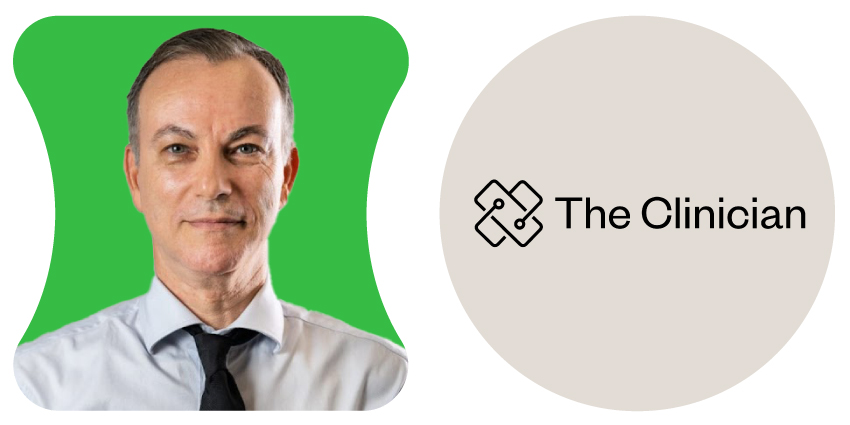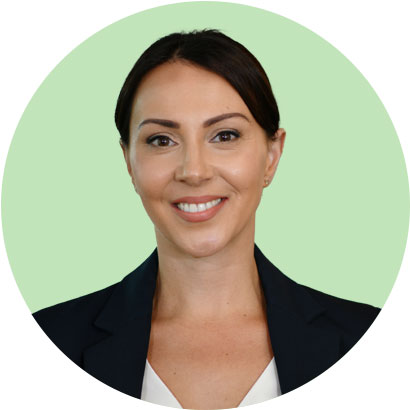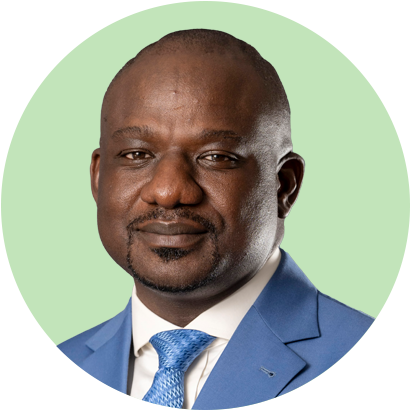Every month we have focus on one of our Implementation Partners; this program was set up to support providers in establishing ICHOM Sets within daily clinical practice, and our network offers support in technical, change management, costing and resource planning.
This month we are interviewing our implementation partners The Clinician. We are excited to hear from Dr Ron Tenenbaum, Chief Executive Officer.
Q: Can you give us a brief introduction to The Clinician, and what you do?
We are a global healthcare company supporting providers, payers and health systems in value-based healthcare implementation through the digitisation of patient care journeys and systematic collection and utilisation of patient-reported measures (PROMs and PREMs).
Founded by clinicians, our mission is to pioneer a new era in healthcare where patients, providers and payers work together to improve healthcare delivery, by measuring and utilising the outcomes that matter most to patients.
Working in partnership with healthcare organisations internationally, we bring together domain expertise in value-based care implementation with a cutting edge healthcare platform that improves the accuracy and completeness of patient-centred health data collected while powering clinical decision-making at all levels of the health system.
Q: What is The Clinician’s expertise in helping clients with Value-Based Care?
Our core focus to date has been supporting organisations to systematically collect, analyse and utilise patient-centred outcomes data to improve care delivery at the micro (patient-provider), meso (organisational) and macro (policy, population health and payments) level.
The specific expertise we provide depends on where an organisation sits within that journey but it spans from the initial design phase (mapping the patient journey and what measures/standards to adopt, defining data flows and governance, creating meaningful data visualisations, etc.) right through to digital implementation where we configure and deploy our health platform to automate patient outreach, collection, analysis and visualisation of real-time patient-centred health data (PROMs, PREMs, CROMs, etc.).
Our expertise has come through in a number of impactful collaborations with healthcare organisations across more than 8 countries, all of which are centred around a shared long-term commitment to value-based care and improving the outcomes of patients.
Q: What do you see as the biggest challenges – and opportunities – in expanding the network of healthcare providers using VBHC models?
Over the past few years, we have seen a momentum shift in awareness and adoption of VBHC models, with an increasing number of healthcare providers and payers moving from thought to action.
With health systems and organisations today establishing dedicated value-based care teams and initiatives, mandating collection of patient-reported measures (PROMs and PREMs) and extending the definition of quality to include those outcomes that matter most to patients, the core challenges concerning strategic focus, resourcing and budget are slowly being replaced by challenges related to change management, clinical buy-in and implementation.
As our healthcare partners move from thought to action, some of the key challenges we are observing today include:
- Optimising data collection: systematically collecting accurate and complete patient-centred outcomes data (with patient response rates above 70-80%) in an efficient manner is a common challenge we see organisations looking to solve in their transition to VBHC models.
- Clinical buy-in: while top-down adoption of VBHC is essential, a lack of clinical buy-in from the bottom-up, due to poor communication and a lack of clinical involvement in the design phase, is a barrier to success.
- Interoperability of data: VBHC models require data to flow from and between different systems, requiring collaboration between stakeholders to overcome the human and technology challenges related to interoperability.
- Data utilisation: a common challenge we see with our partners is a lack of understanding on how to use the patient-centred data being collected, both at an individual patient level and an aggregated population level.
From our perspective, each of these challenges also presents an exciting opportunity for expanding the network of healthcare providers using VBHC models.
Naturally, the growing number of providers collecting high quality outcomes data opens up the potential for learning within and across organisations. We are entering an exciting new phase where healthcare providers and payers will be able to deliver more personalised care to patients based on real-time outcomes data while analysing population-level data of different patient cohorts to design and implement targeted quality improvement initiatives. Federated learning will enable organisations to more easily and securely share data across firewalls and geographies while policymakers at the macro level will have more information from which to accelerate the shift away from fee-for-service models towards value-based payment contracts.
As such, there is a lot to be optimistic about and we are pleased to be helping play a central role in addressing the key challenges that organisations face today in the adoption of VBHC models.
Q: What message do you have for our different audiences (e.g., providers, regulators, payers, patient organizations etc.) about how they can support the transformation to an outcomes-based healthcare system?
To providers, co-design your VBHC initiatives with clinicians and consumers and look at where you can leverage existing work and/or motivated clinical champions to achieve quick wins that support adoption. Seek support from those who have gone through the process before and where possible, apply learnings from other change management initiatives that your organisation has gone through.
To regulators, continue being a catalyst for change and working with stakeholders from across the sector to support policy that advances the collection, analysis and utilisation of patient-centred quality measures, while safeguarding the privacy and confidentiality of patient healthcare information.
To payers, invest in value and be bold in developing models that incentivise improvement in quality based on what matters most to patients. By becoming more proactive partners in the healthcare journeys of your patients and adopting innovative approaches to healthcare delivery underpinned by patient-centred outcomes, we can create a system that improves outcomes and the bottom line.
To patient organizations and patients themselves, you have a critical role to play in shaping the design and delivery of value-based healthcare models. Make your voice heard, be an active participant in decision-making at every level, and advocate for transparent quality measures that allow you to make informed, shared decisions with healthcare professionals.
Finally, to technology and service companies with the same vision as ours, continue innovating for impact and developing solutions that meet the real-world needs of providers, payers and health systems globally. Be long-term and trusted partners in that journey and keep your focus firmly on the needs and experiences of the end-users.
VBHC transformation requires a collective effort, with each of us playing a unique yet connected role in the development of sustainable health systems that deliver better health outcomes for individuals and communities.
Q: Can you share any examples where you’ve helped clients successfully adopt VBHC models?
We have a number of impactful collaborations with healthcare organisations to support the adoption of VBHC models. One recent example is our partnership with Northern Health, a major healthcare services provider in Victoria, Australia.
Working with the Director of Respiratory Medicine, Dr. Katharine See, and the Lung Mass Clinic team at Northern Health, we developed and deployed a digital care pathway automating the collection and analysis of patient-reported outcome measures (PROMs).
The digital pathway configured within our platform was developed in co-design with clinicians and consumers, based on the ICHOM Set for lung cancer. Importantly, the digital pathway was integrated with the existing patient administration system and outpatient medical record to minimise the burden for clinician participation and support utilisation of PROMs data during consultations with patients.
The Lung Mass Clinic team has seen numerous benefits from the program to date, with clinicians using the real-time PROMs data during consultations with patients to facilitate more holistic and personalised care delivery, while each quarter PROMs data is reviewed in the lung tumour stream quality and safety meeting to identify gaps in care and facilitate improvement initiatives.
The results speak for themselves with 90% patient response rates, 90% clinician satisfaction and an average improvement in patient activation of 6 points. In summarising the benefits of the pathway and the importance of the data being systematically collected, Dr. Katharine See said: “…the information that you get is so powerful, I think it’s completely practise changing”
Q: How do you think the healthcare part of your business will look ten years from now – and what role will VBHC models play within it?
Firstly, healthcare organisations will move beyond data collection and analysis to utilisation, embracing predictive and proactive models of care based on multiple sources of high quality data (clinical, administrative, patient-reported, case-mix, etc.). We expect that the integration of large diverse data sets (including patient-centred outcomes) together will enable more precise patient stratification that, with the help of machine learning and artificial intelligence, will drive better forecasting of outcomes and precise interventions at earlier stages of disease.
Secondly, we expect that federated learning platforms and policy will support greater sharing of anonymised, aggregated outcomes data across organisations and ultimately across borders. This will open up new possibilities for health system learning and improvement.
Thirdly, we will continue to see consumer-led changes in the healthcare landscape, with patients wanting and expecting greater access to outcomes and experience data, empowering them to make informed decisions about their care. Similar to selecting other services based on experiences and standard measures of quality, patients will be able to choose healthcare institutions based on transparent and publicly available information, fostering competition and accountability in the industry.
Lastly, we anticipate that there will be a convergence of patient-generated health data whereby wearable and sensor data that captures a patient’s objective health status is brought together with subjective patient-reported data, providing a full 360 view of the patient outside the walls of the clinic/hospital.
Underpinning all of these changes will be the continued focus on delivering better health outcomes and experiences for the end consumer (the patient) within the resources and budgets available. Enhanced utilisation of data will drive improved clinical decision making and reductions in waste, while improved efficiency through automation and cutting edge digital technologies will reduce administrative burden and associated costs.
We are beginning to see a lot of these changes taking shape today and are actively investing in our team and technology to support the next stage of VBHC transformation.




































